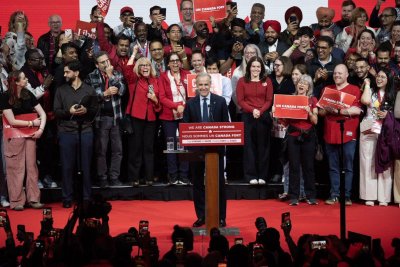April 28 (UPI) — Canadian Prime Minister Mark Carney and his Liberal Party were poised to lead a fourth consecutive government late Monday, as voters of the Great White North had their say in a federal election that was dominated by U.S. President Donald Trump, his trade war and threats of annexation.
According to early Tuesday election results from Elections Canada, the center-left Liberal Party had secured 167 of the 343 seats in Parliament, but it was still too early to tell whether it would form a minority or majority government, the latter requiring a minimum of 172 seats.
“Who’s ready to stand up for Canada with me?” Carney asked his cheering supporters in Ottawa in what was essentially a victory speech. “And who’s ready to build Canada strong?”
Carney spoke of the Canadian values of humility, ambition and unity that he will work to uphold every day as prime minister.
His victory marks a dramatic about-face from late last year, when it appeared the Liberals were headed for a Conservative defeat. What changed was the resignation in January of increasingly unpopular Prime Minister and Liberal leader Justin Trudeau — and the return of Trump to the White House. Since late January, Trump has upended the once-strong U.S.-Canada relationship with threats of annexation and the imposition of 25% tariffs on Canadian steel and aluminum, cars and auto parts.
The Liberal Party has since ridden a wave of anti-American sentiment that has taken over Canada and Carney, the former governor of the Bank of Canada, has repeatedly described Trump’s actions as a “betrayal” and a fundamental shift in the U.S.-Canada relationship.
In his speech early Tuesday, Carney said Trump’s threats were designed “to break us so that America can own us.”
“That will never, ever happen,” he said.
“When I sit down with President Trump, it will be to discuss the future economic and security relationship between two sovereign nations and it will be with our full knowledge that we have many, many other options than the United States to build prosperity for all Canadians.”
“We will chart a new path forward because this is Canada and we decide what will happen here.”
Pierre Poilievre, the leader of the right-leaning Conservative Party, spoke to his supports — also in the capital Ottawa — and conceded defeat, stating, “We didn’t quite get over the finish line.”
“We know that change is needed but change is hard to come by. It takes time, work, and that’s why we have to learn the lessons of tonight.”
The Conservative Party won 145 seats.
He also congratulated Carney on his “razor-thin” government victory, generating boos from the crowd, which he quieted by stating “there will be plenty of opportunity to debate and disagree, but tonight we come together as Canadians.”
However, it was not clear early Tuesday whether Poilievre would be able to hold onto his seat in the Ottawa-area riding of Carleton, where he was in a tight race against Liberal challenger Bruce Fanjoy.
Left-leaning New Democratic Party leader Jagmeet Singh also stepped down after conceding his Burnaby Central riding. In an emotional speech, Singh said “It’s been the honor of my life to represent the people of Burnaby Central.”
“We may lose sometimes and those losses hurt. You know, it’s tough. But we are only defeated if we stop fighting,” he said. “We’re only defeated when we believe that those that tell us that we can never dream of a better Canada, a fairer Canada, a more compassionate Canada.”
The defeat to the NDP also sets it up to lose its official party status. The NDP’s seven seats falls below the 12-seat threshold.
The Bloc Quebecois won 23 seats.
Poilievre, often viewed as a populist politician in the Trump mold, ran on a platform focused on cuts to government funding, the loosening environmental regulations to allow for deeper exploitation of natural resources and reducing bureaucracy.
The election had seen around 7.3 million Canadians cast early ballots, up from the 5.8 million who voted early in 2021 federal election.
In-person voting began at 7 a.m. EDT in Canada’s easternmost province, Newfoundland and Labrador.
While final results in Canada’s federal election were expected Monday night, the process will be a bit slower than in the United States. Canada uses paper ballots, which are counted by hand in front of representatives for each candidate. Each polling station’s results are then reported to Elections Canada before being released online.
